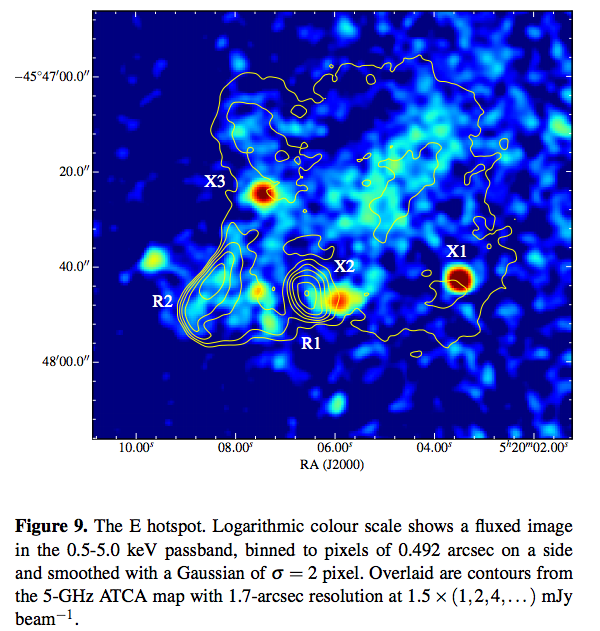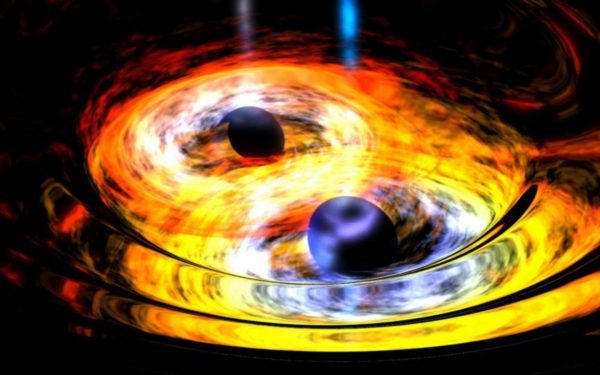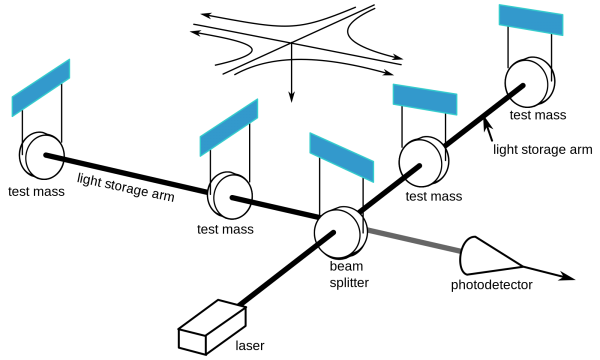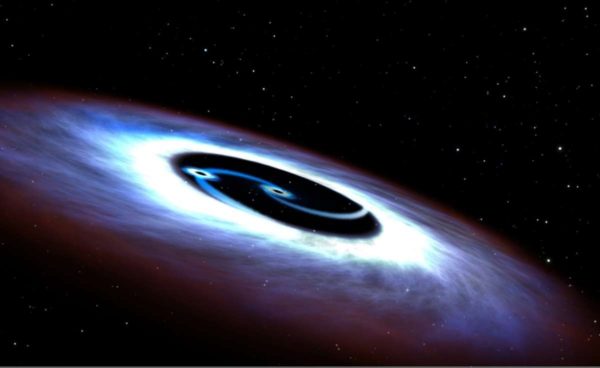“All sins have their origin in a sense of inferiority otherwise called ambition.” -Cesare Pavese
After another Universe-investigating week here at Starts With A Bang, I'm pleased to make two simple but very satisfying announcements:
- The latest Starts With A Bang podcast, on Interstellar Travel, will be going live next week, so look for it soon!
- I just signed a contract to write my second book, on the real-life science and technology of the Star Trek and Star Trek: The Next Generation franchises!
So if you've got comments on either of those, or suggestions or whatever, you know what to do. Hopefully, more good news coming soon, as we're again just one or two nice donations away from our next goal on Patreon! In the meanwhile, here's what you missed if you didn't catch it all this week:
- Why do sunbeam look like... sunbeams? (for Ask Ethan),
- Most powerful black hole jet ever spotted by NASA's Chandra (for Mostly Mute Monday),
- Humanity may be alone in the Universe,
- What is the future of gravitational wave astronomy?,
- Origin of LIGO's merging black holes finally discovered, and
- What does scientific consensus actually mean?
There's always a lot to think about and chew over, and a lot coming up to look forward to. But before we dive into next week, let's look back at the best of what you've said for our Comments of the week!
From Narad on old-school notation: "What amazes me is that the Unicode garbage can doesn’t include fractional arcseconds and friends (look at the figure legend)."
Actually, what you're talking about as fractional arcseconds -- where an arcsecond is " and what appears to be the "fractional" symbol is an asterisk * -- is actually a ruse! The asterisk is a note referring to someone else's work, rather than van Maanen's own observations! There is, as far as I know, no official notation for a fractional arcsecond, but arcseconds themselves are simply italicized double quotes, or ".
The Cigar Galaxy, M82, and its supergalactic winds that would drive all this matter out of the galaxy itself, were it not for dark matter. Image credit: NASA, ESA, The Hubble Heritage Team, (STScI / AURA); Acknowledgement: M. Mountain (STScI), P. Puxley (NSF), J. Gallagher (U. Wisconsin).
From Wow on the moving goalposts argument: "“That is a hypothesis that can be treated scientifically, and quite emphatically falsified.”
Only if you’re talking to someone who is open minded and not willing to retcon a new feature to change the “theory”..."
Sometimes, in a scientific investigation, it's actually important to not lose the germ of a good idea because all of the predictions don't pan out. When cosmological inflation was first proposed, for example, it solved the flatness, horizon, and monopole problems, but the mechanism that Guth proposed for it couldn't reproduce an isotropic and homogeneous Universe. The model he created would reheat the Universe by causing a vacuum transition in the bubble walls of inflation, which needed to collide to give a matter-and-radiation filled Universe.
But because of the exponential expansion of space, the bubbles don't percolate together, and hence would never collide. This requires a new model of inflation, one where the energy would be released inside the bubbles themselves rather than in the walls, which occurred in slow-roll inflation, rather than Guth's model which became known as "old inflation." But there's a big difference between this -- where there was a well-defined set of tunable parameters for a model -- and going to great lengths to save the conclusions of a model that has clearly been falsified.
I assert that most people, scientists included, are not as good at telling the difference as they think they are.
 Sunbeams shining through the trees at Oxford, by Wikimedia Commons user Remi Mathis, under a c.c.a.-by-s.a.-3.0 license.
Sunbeams shining through the trees at Oxford, by Wikimedia Commons user Remi Mathis, under a c.c.a.-by-s.a.-3.0 license.
From cope on sunbeams: "So now a follow-up on anti-crepusular rays, yes?"
Oh no! But I will give you a follow-up as to a common misconception as to why the beams themselves look like beams: the Tyndall effect! When there are particles suspended in a medium -- dust, water, grains, colloids, etc. -- that are comparable in size to the wavelength of visible light, the light of varying wavelengths will be preferentially scattered, creating a very neat optical phenomenon where the rays themselves are apparent and clearly visible. This can also result in an apparent coloration where none existed originally, as blue or red light could be preferentially kept or scattered away.
 The Tyndall effect in opalescent glass, where the glass appears blue in the light, but allows orange light through. Image credit: flickr user optick under a c.c.-by-s.a. 2.0 license. Via http://www.flickr.com/photos/optick/112909824/.
The Tyndall effect in opalescent glass, where the glass appears blue in the light, but allows orange light through. Image credit: flickr user optick under a c.c.-by-s.a. 2.0 license. Via http://www.flickr.com/photos/optick/112909824/.
But sunbeams themselves do not display the Tyndall effect, as the water droplets in the air are far larger than the wavelength of light; there is no preferential color scattering. All you're seeing, with a sunbeam, is the interplay of light and shadow, producing a neat optical effect.
An annotated version of the X-ray/radio composite image of Pictor A, showing the counterjet, the Hot Spot and more. Image credit: X-ray: NASA/CXC/Univ of Hertfordshire/M.Hardcastle et al., Radio: CSIRO/ATNF/ATCA.
From Michael Kelsey on the misalignment of the counterjet: "s the apparent “misalignment” of the eastern radio lobe with respect to the jet axis merely a visual artifact? The western lobe appears to have its symmetry axis aligned well with the faint counter-jet, but the eastern lobe seems to be substantially north of where it “ought to be.”"
Ignoring the east/west distinction here, it's pretty clear that the radio and X-ray align for the "jet", and that there's significant offset with the "counterjet." As the Hardcastle et al. paper notes -- using your "eastern" notation, by the way -- this is a problem:
The counterjet is much fainter than the jet and is detected at high significance for the first time in these observations. It is not visible very close to the nucleus, and merges into the diffuse emission associated with the E hotspot. It is notable that it does not align with the brightest radio structures in that hotspot, though it does point towards a bright X-ray feature.
Take a look at the high-resolution imaging they did, with the X-ray data in false color and the radio data in contours.
 Figure 9 from the Hardcastle et al. (2015) paper, linked above. Image credit: X-ray: NASA/CXC/Univ of Hertfordshire/M.Hardcastle et al., Radio: CSIRO/ATNF/ATCA.
Figure 9 from the Hardcastle et al. (2015) paper, linked above. Image credit: X-ray: NASA/CXC/Univ of Hertfordshire/M.Hardcastle et al., Radio: CSIRO/ATNF/ATCA.
It's worth noting that the jet is approximately 7 times more pronounced than the counterjet, and so the counterjet data itself is far less good. There are, additionally, point sources (X1 and X3) which may be background sources, and unrelated to the emission coming from the core of the galaxy. The misalignment is there and it is real, but the crux of your question -- why -- is something that the data is insufficient to answer. Which is to say, it's a good question!
Illustration of the planet-finding space telescope, Kepler, from NASA. Image credit: NASA Ames/ W Stenzel.
Three questions from See Noevo on astrobiology and life beyond Earth: "1) I’m not sure what “exo-evolution” is supposed to be, but I’m pretty confident I’ve never seen the term before.
2) “Astrobiology” technically should mean ‘the study of life/biology in the cosmos outside of earth’.
It’s always struck me as having the legitimacy and gravitas of “unicornbiology”.
3) You’re effectively saying that abiogenesis is ‘hardly a certainty’.
What is the alternative to abiogenesis, Ethan?"
Sometimes, good words don't exist, so I make them up. Evolution of life on exoplanets doesn't have a word, so I hereby officially coin the term exo-evolution to refer to it. You're welcome for the new scientific phrase.
Astrobiology includes life on the Earth, because Earth is part of the cosmos, and so are you and I.
Abiogenesis is 100% a certainty, though. I strongly encourage you to reread my full article (link provided right here) and rethink your effective conclusion. The Universe, at the inception of the hot Big Bang, did not contain life. It contained ingredients that would, billions of years later, form life. At some point, the transition from non-life to life happened; it may have been slow or hard, it may have been gradual, it may be easy or difficult to define, but it happened. That is abiogenesis. The alternative to abiogenesis is that, for the first time ever, science is not applicable to the natural phenomena in the Universe.
Sometimes -- and I get a lot of questions on a lot of different fronts that I ignore -- there's no good scientific alternative to what science has definitively concluded and ruled out.
 Image credit: Brian Smallwood, http://www.spaceprime.com/.
Image credit: Brian Smallwood, http://www.spaceprime.com/.
From Noah on the Drake equation: "Thank you for this Ethan. Since high school in the 80s I’ve been baffled by the general willingness to assign worth to the Drake equation. Even as a 16 year old it struck me as less than meaningful, when we have simply no idea what the likelihood of life arising is."
The meaningful part of it is what I like to call "parametrizing our own ignorance." It's a lot easier to break down a big unknown problem into smaller unknown problems, but we can't really know if we're doing a good job of breaking it down. Is multicellular life actually required for a technologically advanced civilization, or are there single-celled bacteria working together as a hive that are now spacefaring and tool-using? Are there other steps that life must take to become intelligent that the Drake equation just glossed right over? We don't know, and this is the great failing of the Drake equation from a scientific standpoint.
In other words, we're still ignorant.
Moon and clouds over the Pacific Ocean, as photographed by Frank Borman and James A. Lovell during the Gemini 7 mission. Image credit: NASA.
From eric on being fair to Adam Frank: "This is a sore point that crops up on science blogs probably at least once a year (and sometimes more frequently): some scientist writes an article detailing some new finding, and the layperson editor gives it some crazy hyped up misleading title…and who pays for that mistake? It ends up tarnishing the reputation of science, not the media editors who do it."
Adam Frank told me he has some problems with my article, and will write a follow-up. I'm looking forward to it. The paper itself was not bad. I will agree that he did calculate probabilities and was honest about what it does or doesn't mean, but the problem with his popular write-up goes beyond the title: it indicates very strongly that there are so many chances that there really ought to have been other aliens by now. And that part is what I take issue with. The title was just the start.
 Artist's impression of two merging black holes, with accretion disks. Image credit: NASA / Dana Berry (Skyworks Digital).
Artist's impression of two merging black holes, with accretion disks. Image credit: NASA / Dana Berry (Skyworks Digital).
From Outtatheblu on gravitational waves: "My question is this: assuming there would be a distance safe enough from the black hole merger that you wouldn’t be fried by the ‘normal’ radiation from this merger (X-rays etc as well as being well outside the event horizon), what would a casual observer experience from the ripples in the gravitational waves in space-time itself?"
The thing is, you're used to gravity being an inverse-square force, and for things like brightness falling off as one over the distance squared. I'm going to disappoint you when I tell you that gravitational radiation (for some very technical reasons) falls off as one over the distance, not one over the distance squared. So if you want merging black holes to be ten orders of magnitude closer -- say, 0.14 light years (30 times closer than the nearest star) instead of 1.4 billion light years -- they would compress the entire Earth by 10 microns, rather than the width of a proton. That's not enough for a casual observer to experience anything they'd notice!
 Image credit: public domain / US Government, of a schematic of how LIGO works. Modifications made by Krzysztof Zajączkowski.
Image credit: public domain / US Government, of a schematic of how LIGO works. Modifications made by Krzysztof Zajączkowski.
Unfortunately, if you want even your detectors to change noticeably to, say, human senses, the black hole would need to be so close that the tidal forces would tear our planet apart. By time you're close enough to feel the effects of gravitational waves, there are much greater gravitational catastrophes that are going to ensue.
So you're not going to experience much from gravitational waves, and that's a very good thing!
From Omega Centauri on which black hole is bigger: "In this close supermassive binary scenario, the heavier star (A) goes SN, and then strips the outer layers off the companion B. Now supposedly B collapses more or less directly into a BH. Which one ends up as the heavier BH? A because it was more massive, or B because the collapse is more efficient?"
A was more massive, A made a black hole first, A absorbs some of the mass of B when B was still a star. So A has those things going for it. B, as you note, can simply have its core collapse very efficiently. It's very hard to say which one was bigger, or which one is generally bigger, because in the two events we've seen so far, they've been fairly comparable (less than a factor of 2) in mass. So we can do numerical simulations, but until we have a much better set of data, I'm going to hedge and say it could go either way, but I'd bet on A.
The Hanging Naked Man orchid. Image credit: Jerry Coyne via https://whyevolutionistrue.wordpress.com/2015/11/06/the-bizarre-naked-m….
And finally, as one last follow-up on the development of biology as a science, where I myself said this very non-controversial statement that sparked a wild comment string: "Think about evolution, for example. Many people still rally against it, claiming that it’s impossible. Yet evolution was the consensus position that led to the discovery of genetics, and genetics itself was the consensus that allowed us to discover DNA, the “code” behind genetics, inherited traits and evolution."
Science, I would like to point out, is not indelibly written in stone by the scientists who make the major discoveries. I have no idea what Mendel thought of evolution or of Darwin, but that's not relevant to his contribution to genetics and what genetics explains. It doesn't matter what Brahe thought about planetary orbits; the data he gathered is what matters. It doesn't matter whether Einstein believed in an expanding Universe or gravitational radiation or not; it matters what his theory predicts and what the observations show.
Evolution is the idea that species change over time, and Darwin's great contribution was the mechanism of both mutation and natural selection. Genetics provides the mechanism for inheritance and randomization of traits among offspring, and DNA provides the code for those genes and allows us to understand how mutations occur at a molecular level. This is how science generally progresses, and evolution provides a very nice example. I hope you continue to enjoy the show!




“When cosmological inflation was first proposed, for example, it solved the flatness, horizon, and monopole problems, but the mechanism that Guth proposed for it couldn’t reproduce an isotropic and homogeneous Universe… This requires a new model of inflation, one where the energy would be released inside the bubbles themselves rather than in the walls, which occurred in slow-roll inflation, rather than Guth’s model which became known as “old inflation.” But there’s a big difference between this — where there was a well-defined set of tunable parameters for a model — and going to great lengths to save the conclusions of a model that has clearly been falsified.”
Ethan, is the “old inflation” model the same one that Guth was awarded $3,000,000 for developing?
IF his model was falsified, does Alan have to give the $3 M back?
……………
“Abiogenesis is 100% a certainty, though.”
Thanks for clearing that up, Ethan.
And for thus implying that there’s no need to find an alternative (even though abiogenesis is not falsifiable and all tests/experiments for it come up dry).
Sean T and eric might thank you, too.
http://scienceblogs.com/startswithabang/2016/06/21/humanity-may-be-alon…
………………
“…are there single-celled bacteria working together as a hive that are now spacefaring and tool-using?”
I look forward to the movie.
Which bacterium do you think would play Admiral Kirk?
(Or maybe Admiral “Drake”?)
…………..
“Science, I would like to point out, is not indelibly written in stone by the scientists who make the major discoveries.”
But “science” IS indelibly written in stone by the scientists who do NOT make major discoveries, like you.
For example, abiogenesis would be a major discovery, but abiogenesis has NOT been discovered. It hasn’t been observed in nature nor has it been coerced in any lab.
Yet YOU say “Abiogenesis is 100% a certainty, though.”
You can’t get much more indelibly in stone than 100% certainty.
(Of course, I think it’s pretty rocky.)
……………….
“And finally, as one last follow-up on the development of biology as a science, where I myself said this very non-controversial statement that sparked a wild comment string: “Think about evolution, for example. Many people still rally against it, claiming that it’s impossible. Yet evolution was the consensus position that led to the discovery of genetics…”
I wouldn’t call it a “wild” comment string. But I stand by mine. Including this part:
“Regardless, EVEN IF [Mendel] DID believe in [evolution], neither his discovery of genetics nor that of the safety and effectiveness of vaccines nor that of fluoridated water NOR ANY MEDICAL/SCIENTIFIC/TECHNOLOGICAL DISCOVERY beneficial to mankind or animal kind –
NONE OF THEM REQUIRED A BELIEF IN EVOLUTION.
How can you say such crap, Ethan?
Crap that you KNOW, or certainly SHOULD know, is false?”
@Ethan
It was a crazy week but I wanted to offer belated congratulations on the 'humanity may be alone in the universe' piece. It made the front page of RealClearPolitics. You had to be close to 100,000 page views in 24 hours. I'm not sure what your record is that that was solid.
"Crap that you KNOW, or certainly SHOULD know, is false?”"
As has been explained to you numerous times, it is not fslse. You simply won't give up your.lie, because to do so exposes a major flaw in your non-science view of the world. Normal people see how wrong you are.
SN
You are at it again. You are either ridiculously confused or misrepresenting the point I tried to make. Ethan is 100% correct; it is a certainty that abiogenesis did occur. At one time there were no living organisms in the universe, now there are. That is not in dispute. Even your belief system doesn't dispute that there was a time when the earth was lifeless.
I was addressing a different question, namely whether it is a certainty that abiogenesis would occur on a planet with suitable conditions.
The answer to this question is really not known, but my bet would be on it not being a certainty. Like I tried to explain with my lottery analogy, a lottery ticket gives one a CHANCE to win the jackpot, but not a certainty of doing so. Holding a ticket is analogous to a planet with the appropriate environmental conditions. There is a chance, but no certainty, of life arising. Obviously winning the jackpot is analogous toblife actually arising. Eqrth won the jackpot, but I don't see how it can be said that life arising on earth was a certainty any more than one can say it was certain that the mist recent Powerball winner's jackpot win was a certainty.
"There is a chance, but no certainty, of life arising"
Sean T have you ever read any of CS Lewis works?
Here is a quote to ponder:
"“Each day we are becoming a creature of splendid glory or one of unthinkable horror.”
it's time to move on beyond the who came first chicken or egg debate because we are now conscious beings.
That consciousness of self awareness and the responsibility that comes with it are where we are now.
Good vs. Bad
Quote: “No man knows how bad he is till he has tried very hard to be good."
Ethan, unless you're pulling my leg, I know the difference between an asterisk and and a double prime, and I presume that you're familiar with AASTeX's \fdg, \farcm, \fh, and so forth. I know of what I speak – I was witness to the death of the ApJ's typesetter.
To Sean T #4:
Just so no onlookers are confused by your Powerball bullsh*t, let’s make this perfectly clear:
1)Both you and Ethan say the CERTAINTY is ONE HUNDRED PERCENT (100%) that life on earth began by ABIOGENESIS (a phenomenon never observed in nature and never engineered in any lab).
2)Yet, you, no doubt, would agree with Ethan that “Science… is NOT indelibly written in stone by the scientists who make the major discoveries [of which abiogenesis is absent].”
That is, like the commercial says, PRICELESS.
(This may even be a *possible* example of future evolution!
https://www.youtube.com/watch?v=WFNXwor69-U
)
Beg pardon? The prominent jet is south of the center of the 6 cm ATCA radio image. I've been working on the premise that this was the basis of Michael's original question. Look at the upper panel of Figure 3 in comparison with the radio contour.
No, it's precisely the opposite, and Figure 9 demonstrates nothing whatever about the overally asymmetry.
^ "overally"
To Ragtag Media #5:
“it’s time to *move on* beyond the who came first chicken or egg debate because we are now conscious beings. That consciousness of self awareness and the responsibility that comes with it are where we are now. Good vs. Bad”
Sounds good.
But you may as well be speaking to the wind.
Atheists like Sean T, *as well as* so-called Christian theistic evolutionists, *refuse* to “move on” for the simple reason that to do so would destroy their preferred worldview and “morality”.
The two seamingly distinct groups are just on somewhat different points of
the spectrum of ‘I’ll-do-what-I/me/mine-wants.’
P.S.
Have you ever read any G.K. Chesterton?
Here is a quote to ponder:
“It’s not that Christianity has been tried and been found wanting. It’s that Christianity has been found difficult and left untried.”
Here’s another:
Chesterton, upon being asked “What’s wrong with the world?”, responded:
“I am.”
SN,
Aren't you getting tired from lugging those goalposts around? Nobody ever said life on earth began via abiogenesis. It is certain that life in the UNIVERSE began by abiogenesis. Life (or precursor chemicals to it) could have originated elsewhere and later seeded the earth.
Even if abiogenesis occurred on earth, though, its success was never certain. It's only certain when looking at it after the fact. Approximately 4 billion years ago, the success of abiogenesis was far from certain. A change in environmental conditions, a key reaction failing to occur, an alternate chemical aggregate coming to be more prevalent, or some other occurrence could easily have derailed abiogenesis. That was my point. It is an important one because it arose when discussing exoplanets, where the presence of life is far from certain. When discussing the possibility of life on other planets, the uncertainty of the processes leading to life arising certainly has to be a key point to take into account.
Far from BS, my lottery analogy is pretty good. Earth won the lottery, but if things had occurred differently, it may not have. Other planets, as far as we can tell, may have tickets as well. We don't really know whether their tickets are winners, though.
Congratulations, you've quoted something that should strike terror into your pathetic, stupidly trolling ass, viz., tat tvam asi. You would have done better – although it's probably beyond your Play-Doh–eating limitations – to have gone with Meister Eckhart.
Oh, silly me:
Have you?
That's not even a real quote. The first clause exists solely in a freaking Yahoo Answers reply from one "Catty." You've also got the second sentence wrong.
C'mon, S.N.: (1) identify the source document and (2) provide the preceding sentence. I'll wait, as I imagine you have a lot of Chesterton on your imaginary bookshelves to go through.
"Sometimes, in a scientific investigation, it’s actually important to not lose the germ of a good idea because all of the predictions don’t pan out."
But we should be open to being wrong, and not get so invested in an idea that we grab any straw to keep the theory alive.
Remember, your claim was quite specific and has shown quite exactly the proposition that I cynically promoted when encountered in the real world rather than in the realm of imagination.
Remember: "God did it" has been wrong every time we've tried and successfully found a reason for everything that has happened so far.
If a proposition fails 10,000 times, we really shouldn't have to work on the 10,001th without someone else having done enough work themselves.
And, retconning the "God" to being "Well, god set up the rules, therefore I'm right" whch the "sophisticated" theist inevitably runs to doesn't work, because that deist conception isn't the one they had when they promoted the idea "God", and isn't one that we even need bother thinking of or for.
"I assert that most people, scientists included, are not as good at telling the difference as they think they are."
Uhm, scientists are people too.
:-)